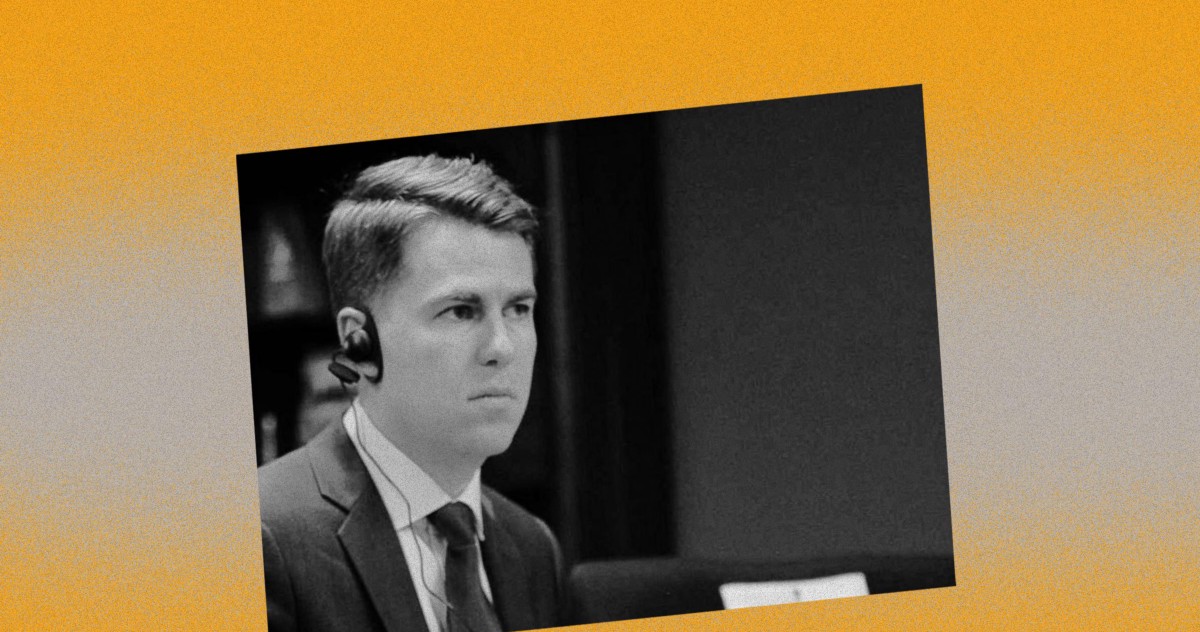Miles Taylor Is Sick of Hearing About the Deep State

GEN: What do you make about acting Secretary of Homeland Security Chad Wolf getting formally nominated to be secretary?
Miles Taylor: I think given everything that’s happened in this administration, he’s going to face some extremely difficult questions if there is a confirmation hearing. And it seems to me that it’s unlikely that there’s going to be a confirmation hearing before the election, so I think it would have to be contingent upon the president being reelected.
But in any event, I wish him well as he goes through that process. I hope that people who have witnessed what I’ve witnessed in the Trump administration, when they’re asked under oath, are candid about what they witnessed for their own sake. Because when you are in front of Congress and you’re testifying under oath, you have to tell the truth. So, I do hope that any of these senior officials in the administration, whether they’re going up there for confirmation hearings or testimony, actually answer honestly about their engagement with the president, their perceptions of the commander-in-chief and his fitness for office, and what they’ve witnessed during that time period.
What was the process in which you decided to come forward? Because obviously it’s not necessarily the most pleasant experience to go through.
That’s why I really love the people who say I’m cashing in, because if this is cashing in, then I would strongly recommend that people avoid trying to get rich. This is not the way to do it nor is it a pleasure cruise. But that said, no one needs to play the violin for me.
The biggest personal gain I get out of this is a weight off my chest. A lot of Trump officials who are serving or who have served left with that weight on their chest. So, it’s pretty liberating to come out and just say, “You know what? Dammit, this is the truth. Everyone saw it the same way basically. And now, I don’t have to hide that.”
In terms of timing, really there were a couple things that were important to me. But the most important was, when are people going to be listening? When do people care about who the president is? And that most important period is in the lead-up to the election. So, I don’t begrudge someone who says, “This is a crass political move. You waited until the election.” But my rejoinder would be, were Americans paying attention really? Were most Americans paying attention last summer, for instance?
My urge right after I left my job was to get out there and scream to the rooftops, “Look, this man is inept. He’s not fit for this office.” But two things were true at that period of time. One, Donald Trump would have very successfully distracted and swept it under the rug, and people wouldn’t have listened to the testimony that they really need to hear. And two, quite frankly, when I left this administration, I wanted to put it so far in the rearview mirror that I never had to think of it ever again.
Candidly, my original intent was to begin being more vocal and offering up my testimonies about my time in the administration this spring. Right around the time I was looking to do that, the pandemic hit. I had a conversation with my wife, and I said, “Even though I feel passionately about this, and even though I strongly suspect the president’s going to bungle this response, it’s really the wrong time to attack the commander-in-chief from a political angle while he’s managing a national crisis.” So, I put it on ice for a little bit.
And then, as this summer rolled around, and it became clear that the president wasn’t going to resolve the coronavirus pandemic, there was really no good time to get out there and speak up. And so, just a few weeks ago, I decided, okay, the time is now. There’s no more waiting.
You were in the private sector when the impeachment hearings were going on. Do you have any regrets over not saying anything then?
I think if last summer I started speaking out about this, okay, maybe some people would have listened. But look at how quickly the news cycle changes in terms of Washington. No one cares about anything for that long. And at that point, voters’ minds weren’t in the headspace of let’s review the president and his character and try to make a determination. And historically, around the time of the conventions, people start to actually tune in and pay attention, talk to family members about what they’re going to do. So, it seemed like the right time to have that impact.
I’m making no bones about it. My intended impact here is to make sure the president does not win reelection. If someone wants to accuse me of being a crass political operator by timing this around the convention, yeah, bring it on. This is absolutely the right time to do it.
What about during impeachment?
I didn’t witness anything related to Ukraine, so I felt like it would have been really irrelevant for me to come forward and disingenuously claim I knew anything about those allegations because I didn’t. To me, it seemed like the wrong time.
What did not surprise me during that time period though was that Donald Trump would do what it was alleged that he had done, because that was his inclination when it came to foreign aid. Donald Trump views everything through the lens of his personal self-interest. So, of course, if when he had an opportunity to have leverage over another country, and there was something he wanted, he would use it. And we’ve seen that in other contexts too.
In Latin America, when he was pissed off at Latin American countries for not doing what he wanted them to do, namely, let’s say a caravan was going through and he wanted it stopped. He would tell us, “Cut off all the money to those countries. Cut it all off.” Because, politically, he thought it was harmful to him that these caravans were coming to the U.S. It made him look weak on border security.
But we’d say, “Mr. President, literally under the law, we can’t cut off the money. Congress appropriates it. They say we have to spend it.” There are some funds that are fungible, where you’ve got discretion. Sure, discretionary funds, you can do things like that. But the irony here is that the money that was going to Latin American countries often was to help them with law enforcement and border security. So, it was like, “Let’s not shoot ourselves in the foot, Mr. President, and cancel the funding.”
But he would do that with us. He would say, “Let’s use this money as leverage over them.” So, I was not even surprised at all to find out that he did that with Ukraine.
I know you talked to the Trump campaign to help out on foreign policy. When did you realize your hopes for this were not going to be carried through?
People would be lying to you if they said it was a bed of roses in year one and year two. I think it became evident pretty quickly that the president and his administration were tumultuous at best and disastrous and catastrophic at worst. It didn’t take too long to come to that realization.
But the counterpoint was always, oh shit, if we all leave, there’s going to be a whole bunch of inexperienced Trump lackeys that come in, and they will say yes to everything. They’ll say yes to things that they don’t know are unethical, immoral, or potentially illegal. So, there was still cause, I think, for quite some time to stay in this. The point at which I felt I had to leave was when that no longer worked, when saying, “This is unethical, inappropriate, or illegal, and you shouldn’t do it,” didn’t have an impact anymore on the president or other folks at the White House.
So, when they stopped listening and started going around us, that’s when it was like, “All right, let’s forget about it. There’s no point in being here because we’re not going to be able to do any good anymore.” And specifically, really the climax moment for me was April 2019. When the president suggested to one of our top DHS officials that we should break the law and stop everyone from coming across the border even if they had a right-to-asylum claim, and even if he got in trouble, the president said, “I’ll pardon you.” I was like, “This is so beyond corruption, I can’t stay anymore.”
That was affirmatively the moment where I was like, “Yep, I’m leaving, but I’m going to need a couple of weeks to help facilitate a transition.” And the secretary left shortly thereafter. Then, they fired the deputy secretary. They fired the lawyer who led our department who’d done that review on the pardon question and then worked to fire a new round of a number of other officials. So, they undertook a concerted purge at the department.
Incredibly, I wasn’t in that purge. It was reported to me that White House senior staff met with the president and he had actually said, “Oh, no, Miles Taylor. We’re going to keep him.” And then, not only did they offer me other jobs, but after making sure there was a handoff, I got the hell out.
You say you were trying to keep things from being as bad as they could have been. Looking back, is it something you feel like was worth it? Or do you feel like you ended up being too complicit?
I was immensely disappointed in how much time we had to focus on the insanity of the president’s requests. This is how I characterize it. I came in hoping on a day-to-day basis to spend most of my time focused on the 250,000 men and women from the Department of Homeland Security, on how to better enable them to do their jobs: cybersecurity, counterterrorism, preventing foreign meddling in the democratic process, gangs, drugs. Instead of spending the majority of time focused on those people, we ended up having to spend the majority of our time focused on one person, and that was an irascible, unpredictable, and impulsive president. That was the biggest disappointment.
Are there regrets? Oh, you bet your ass I’ve got regrets. I wish we’d definitely done more to keep the zero-tolerance policy from rolling forward as quickly as it did. We really tried to stop that train or at least slow it down and say, “There’s actually a way to do this that doesn’t result in a bunch of kids being separated from their parents. There is a way to do it as long as we have enough resources.”
Sure enough, within several weeks, it was an absolute clusterfuck. Now, did we try to stop it from going forward behind the scenes? Yes. Did we try to slow it down and say there’s a way to do this that doesn’t have terrible second-order and third-order consequences? Yes. Could we have done more? I think so.
In terms of how this bureaucratic resistance was happening, how did that work, and what did that involve? Was it all internal fights or leaking it because you thought it would be a bad news story? How did you go about doing this?
That’s a good question. Our approach was trying to just make sure we could do the right thing and get the president to do the right thing. And if the president does the wrong thing, you’ve got a lot of different options. If it’s serious enough, you leave. If it’s something that could be fixed, you go back to the president and you say, “We need to fix this. This is a disaster.” If it’s an area where you have a legitimate disagreement, and you think it’ll have an impact on national security, I think there’s an obligation to say that publicly.
But do I think that every administration official who disagrees with the president on something should go out and resign in protest? No. I think that’s fucking stupid. In fact, people have always asked me, “Don’t you think more people should just resign en masse from the Trump administration?” And I say, “Dear God, no.” I think there are some points where it’s very important that when someone is no longer able to be effective, and they can’t convey their advice to the president, then they resign. Jim Mattis was the perfect example: extraordinarily honorable man, reached a point where he thought very bad decisions were being made, and he appropriately resigned from that administration in protest.
But there’s still good people left in this administration, still good people who get it. And by “get it”, I mean they totally understand that the president’s incompetent. But they know that if they leave, they’re going to be replaced by a Trump lackey who really is going to be a bad impact. That said, the guard rails have been peeled off pretty effectively by the president, because he’s got a good nose for good people, and he can sniff them out and kick them out, and I think that’s what he’s done in large part.
Some of the criticism you’ve gotten from defenders of the president is that it’s the president’s decisions, it should be the president’s people. People like you shouldn’t do anything, only what the president says, because you’re not elected and he got picked. What’s your reaction to that?
The president of the United States is ultimately the one that was on the ballot. He deserves his own team, and he makes the decisions. What I’m definitely not saying is that there’s a deep state that should run interference against every decision the president makes and try to frustrate his agenda. That’s wrong in and of itself. That’s subversive and alarming. What I’m talking about is: There should always be a group of people in government who are willing to just tell the president the truth, and if something’s fucking stupid or especially illegal, they should be willing to tell the president, “This is fucking stupid” or “This is illegal” without fear of the consequences, that he might be mad or he might fire them. That’s what I’m talking about.
I think the coronavirus pandemic is the exclamation point at the end of this narrative. The old guard that was in there at the beginning of the administration, people who had served in the Bush years and elsewhere who actually wrote the pandemic response plans, knew how the national security system works, would have known how to respond to the global pandemic. There are plans on the shelf that we have written, and there’s a whole national management system for doing these things. But the Trump administration’s pretty thinly staffed. It’s a thin bench, so when the pandemic broke out, especially at the higher ranks of the administration, there were not people who were prepared to guide the president through that response. That’s a direct result of his unwillingness to keep people around him who dissent and are willing to speak truth to power.
One other question or criticism that I consistently read is that you’re not a real Republican. You’re a RINO, you’re an Obama donor…
I’d say this; I am vastly more of a Republican on paper—and however you would measure it—than Donald Trump is. Donald Trump has spent his whole career spending tens of thousands of dollars, even perhaps hundreds of thousands of dollars, supporting Democrats and taking inconsistent policy positions. I’m a very fiercely ideologically engaged, libertarian conservative. And I guarantee Donald Trump couldn’t name a single political philosopher that inspired classical liberalism which then turned into conservatism which then formed the basis of the GOP. He couldn’t tell you a goddamn thing about the origins of the party.
And the Obama donation?
The Obama donation is one of my favorite attacks against me over the past few weeks because I would compare the $85 donation I made to Barack Obama to the many tens of thousands of dollars that Donald Trump has made to Democrats. I am so proud that I donated $85 to Barack Obama when I was a completely broke college student. I probably should have spent that money on food, or maybe a few drinks with my friends. So I’m proud that I spent that $85 because even though I was gunning for John McCain, and John McCain’s been a lifelong personal hero of mine, I wanted to be able to tell my kids that if Barack Obama got elected president, that in some way I supported the first Black president of the United States. Of course, I knew I was going to oppose him on policy issues, and I did that. I was a big McCain supporter.
As someone who was dealing with things related to pandemic response, how concerned are you about the administration’s plasma press conference the other day that seemed to be exaggerated?
The pandemic will end up being one of the biggest failures probably, even the biggest failure of the Trump presidency. I think he’s completely bungled the response. And that was avoidable, like I said, if the president had used the Department of Homeland Security the way it was meant to be used, which is to lead the nationwide emergency response to national crises. That’s in statutes. It’s spelled out. There’s a road map for how to do it.
There are clear plans that we exercise every year on how this should play out. If he’d done that and just run the government the way that he was supposed to, I guarantee you tens of thousands of Americans who are dead today wouldn’t be dead today. Absolutely, I guarantee you that.
As a homeland security professional, I’m very confident tens of thousands of Americans who are dead right now would be alive instead if Donald Trump had managed the response differently in using the structure that already existed in government.
I think the president’s deliberate and willful spreading of misinformation has made the problem even worse. He’s sown a lot of confusion. The president has so poorly managed this response that he has turned face masks into a political symbol rather than a means of personal protection. I can’t think of any modern historical parallel of a president so completely going against the advice of his experts that it’s resulted in the deaths of Americans.
I know you’ve talked about the president talking about wanting to trade Puerto Rico for Greenland. Did anyone ever have to take this idea to Denmark?
I actually don’t know the answer to that question. It’s possible. It might have happened after I left. But at the time, we didn’t. At the time, we were like this is just one more batshit crazy thing that he has said.
He probably thought that we should have because one of the things the president regularly did was he had no idea what his cabinet secretaries were responsible for. He never really took an academic interest in how to run a government.
We would frequently get orders from him that should go to the attorney general. Or the attorney general would get orders that should go to the secretary of homeland security. Or he would tell the secretary of state to do things that we should do. He had no idea who did what, and he wasn’t really interested in it. So yeah, sometimes he would tell us to do things, and we’d be like, “Yeah, Mr. President, that’s not us.”
What was the wackiest thing you got asked, not perhaps the most significant thing?
The cutting off to aid to Latin America. The president was ordering us to cut off the aid. We literally would say, “Mr. President, DHS doesn’t oversee foreign aid. We are the actual Homeland Security Department.” He’s like, “I don’t care. You shut it off. Shut off the money.” We’re like, “You’re going to have to make a different phone call. You’re going to have to call Secretary Pompeo.”
Years in, he was still doing this all the time. Fundamentally, it would be like someone getting into a car, and you’d be like, “Okay.” And they’d be like, “All right. Let’s see, Fred.” And they’re behind the driver’s seat. They’re like, “I need you to drive me to the gas station.” And you’d say, “Oh, well, I’m in the passenger seat. You’re in the driver’s seat. You actually turn the ignition.” “No. Fred, you turn the ignition.” It was that level of inability to know how to use the levers of government to get things done. He’s still not gotten to that place.
And that was the same thing every day with that? There never seemed to be any new knowledge acquired?
Definitely not. I think that I’ve witnessed few executives in my lifetime that are so incapable of change and growth as Donald Trump.
This interview has been edited and condensed for clarity.


